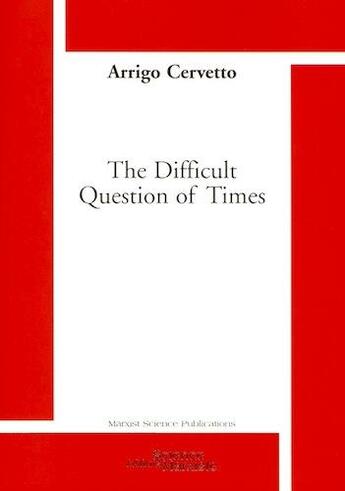Résumé:
With regard to man as a biological individual, time is set by the experience of generations - childhood, adolescence, youth, middle age, and old age succeed each other and provide time with a rhythm. Tragic events, whether individual or collective, can take place, socio-economic changes can... Voir plus
With regard to man as a biological individual, time is set by the experience of generations - childhood, adolescence, youth, middle age, and old age succeed each other and provide time with a rhythm. Tragic events, whether individual or collective, can take place, socio-economic changes can extend the average life (as occurred in the 20th century), but in any case the significance of biological time is a stable element.
Political time, on the contrary, is a historical time subject to the dialectics of accelerations and decelerations. «There are days that are worth twenty years - Cervetto reminds us, citing Marx - and yet, in the movement of matter, one day is one day.» The strategic divide of 1989, that sanctioned the end of the East-European State-capitalist regimes that had been passed off as socialism, was a remarkable evidence thereof.
Biological time and historical time merge in the psychologies of the individuals who are the protagonists of class struggle. This is difficult terrain, because it is subject to the inevitable commingling of rationality and emotions. A revolutionary, a Marxist, anticipates the paces of social changes in his heart. It should not surprise, therefore, that the class movement, through the voice and understanding of its best representatives, has often imagined faster paces than the actual ones. At the end of the 19th century, during a phase of full capitalist expansion, August Bebel did not realize it, and affirmed at the convention of the Social-Democratic party in Erfurt (1891): «Indeed, I am convinced the realization of our goals is so close at hand that few of you in this hall will not live to see it.» Science only can emancipate us from the ascendancy of present time, that almost inevitably leads to mistakes about the reality of today - perceived as absolute reality, independent of any evolution - and thence prepares the disappointments of tomorrow.
This emancipation, this freedom, does not pursue any abstractly predicted aims, but practical objectives. Cervetto wrote: «Revolutionary strategy is based on the analysis of times, not to arrange the future, a task for which an objective real movement doesn't have any need, but rather to establish time deadlines that can act as references in defining immediate tasks in the present, the tasks of tactics. (...) Tactics address temporary situations that are multi-faceted combinations, to take up Lenin's definition, of long-term historical processes.» The more solid the strategy, the more flexible can tactics be. The 'question of times' finds its place in practice, in the daily struggle: «Science is freedom, and it is such because it is not a theory detached from practice. Instead, it is practice guided by theory.»
















